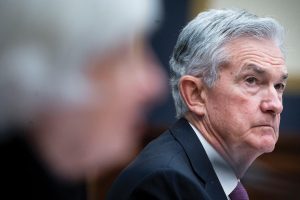Biden to nominate Jerome Powell as Federal Reserve chairman

New York (CNN Business)President Joe Biden on Monday formally announced his intent to nominate Jerome Powell to serve as the chairman of the Federal Reserve for a second term and nominate Lael Brainard to serve as the Fed’s vice chair.
Powell’s four-year term is up in February, and the President faced a key decision of whether to keep Powell, who was put in the job by a Republican, in the government’s most important economic policy job.
At a time when rising consumer prices, inflation and shortages caused by the supply chain crisis are urgent concerns of the White House, there has been heightened focus on who the President was going to pick to lead the nation’s central banking system.
The White House cited Powell’s “steady leadership” amid the economic turbulence of the pandemic as a reason for the decision.
Economic recovery, the White House said in a statement, “is a testament to the success of the President’s economic agenda, and it is a testament to decisive action by Chair Powell and the Federal Reserve to cushion the impact of the pandemic and get America’s economy back on track.”
Biden expressed his “full confidence” in Brainard and Powell in a statement.
“I’m confident that Chair Powell and Dr. Brainard’s focus on keeping inflation low, prices stable, and delivering full employment will make our economy stronger than ever before. Together, they also share my deep belief that urgent action is needed to address the economic risks posed by climate change, and stay ahead of emerging risks in our financial system,” Biden said.
Tough road ahead
Assuming he gets confirmed by the Senate, Powell faces a very challenging situation in his second term at the helm of the Fed.
The United States is grappling with its first inflation scare in decades, parts of the economy remain scarred by the worst pandemic in a century and the Fed’s credibility has been called into question by a trading scandal.
Although Powell seemed to put out the fire over the insider trading scandal with tough new ethics rules, inflation looks like the trickiest obstacle facing the Fed over the coming months.
Up until very recently, the Fed has kept its foot firmly on the pedal, with rock-bottom interest rates and a massive bond buying program stimulating the US economy and financial markets. That’s despite the fact that inflation is surging, hiring is booming and the housing market is arguably hotter than ever before.
Why Biden picked Powell
By sticking with Powell, the Fed is opting for continuity and confirmability. Not only has Powell garnered the support of Republicans and moderate Democrats, he is well respected on Wall Street and investors are very comfortable with his communication strategy.
Switching to a new face risked adding uncertainty to the confirmation process that could have rattled markets. And it would have added complexity to the already difficult task of reassuring investors nervous about the Fed unwinding its emergency policies.
“After an atypically lengthy deliberation phase, the White House ultimately went with the safest choice,” said Isaac Boltansky, director of policy research at BTIG,. “The Powell pick provides leadership continuity that the market always appreciates and should give the White House a victory via a quick and relatively painless confirmation process. ”
By choosing Powell, Biden is also sending a strong signal about the importance of an independent Fed, a norm that came under attack during the Trump era.
Powell vs. Brainard
Biden recently met with Powell and Brainard, a Federal Reserve governor, separately at the White House as he weighed his decision, CNN previously reported. Brainard had been viewed as the leading contender if the President decided against Powell for a second term.
“This is a good decision,” former Dallas Fed President Richard Fisher told CNN. “While Lael Brainard is a most capable economist, appointing her under pressure from progressive Senators like Elizabeth Warren would have sent a signal that the Fed has been overtly politicized, irreparably damaging its reputation for independence.”
Powell has faced significant opposition from some progressive Democrats, who criticize his track record on financial regulation.
Sen. Elizabeth Warren of Massachusetts said at a recent Senate hearing that Powell was a “dangerous man to head up the Fed” and that he has “regularly voted to deregulate Wall Street.” She said a Republican majority at the Fed under Powell’s leadership could “drive this economy over a financial cliff again.”
But some key Democratic constituencies, such as organized labor, have signaled their support for him. Powell won Senate confirmation overwhelmingly for the position in 2018.
The chair’s renomination comes at a time of tumult on the Board of Governors and a trading scandal that had threatened to block Powell from being picked for a second term.
The Fed recently unveiled sweeping changes to its ethics practices in response to the scandal about personal stock trading by then-regional Fed Presidents Robert Kaplan and Eric Rosengren, who led the Dallas and Boston Feds, respectively. Both Kaplan and Rosengren announced early retirements amid criticism about their trades.
Powell, a Republican, was nominated to the Fed’s Board of Governors by then-President Barack Obama. He was elevated to chair by then-President Donald Trump in November 2017 to succeed Janet Yellen, who is now Biden’s treasury secretary. His term as a member of the Board of Governors doesn’t expire until January 2028.
He has been leading a widespread emergency market rescue in response to the economic crisis that followed the coronavirus pandemic.
Though the US has made considerable gains — its economy beat expectations and added 531,000 jobs in October — there are still millions of people sitting on the sidelines of a tight labor market.
Source: Read Full Article

